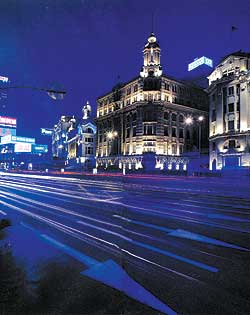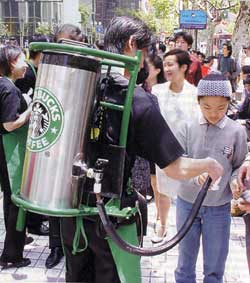 Nepal's "look east" tourism policy will have to focus on the China market. But what can they get here they can't get at home?
Nepal's "look east" tourism policy will have to focus on the China market. But what can they get here they can't get at home? In agreement between China and Nepal has approved Nepal as an official destination for China's outbound tourists. Nepal Rastra Bank has agreed to make the Chinese yuan a convertible currency. That is why Nepal's nervous tourism industry is desperately hoping to fill the vacuum left by dwindling overseas and Indian arrivals with Chinese.
Of course, nobody in Nepal's tourism biz really expects masses of shopaholic Chinese tour groups to immediately start flocking to the Himalayan kingdom.
What can they get here that they can't get at home?
Many, however, are initially banking on the large expatriate communities that live in such "hardship" postings as Beijing and Shanghai.
"Our first target group is China's wealthy expat community," says Subodh Rana of Marco Polo Travels and Director of NICA (Nepal Incentives and Conventions Association).
Royal Nepal Airlines already flies twice a week between Kathmandu to Osaka with a stopover in Shanghai. Despite the midnight departure there is chatter in the cabin, primarily from Japan-bound Nepalis, some Japanese tourists or aid personnel, and a few Chinese businessmen and workers returning home. By and large, most of the passengers are flying to Osaka, via Shanghai, although a metropolis of 17 million (China's second-largest city), is used by RNAC primarily as a refueling stop. There are over a quarter million expatriates living in Shanghai and it would be useful to tap into that market, to convince some of them to spend their holidays in Nepal.
In Shanghai the first thing to do is to head straight for the shopping malls, and plunk into a Starbucks. Royal Nepal Airlines is not listed anywhere in any travel magazine or brochure. Nobody even knew it flew to Shanghai except for one magazine called City Weekend, which a few weeks earlier had published a pictorial travel feature on the Kathmandu Valley.
Jian Ming Wu is a Shanghai businessman and restaurateur who said through an interpreter that he would like to open a Nepali restaurant in Shanghai in partnership with Fulbari Resort, and that they would probably also name the restaurant Fulbari. Just hope Wu gets his fengshui right and that the Shanghai enterprise fares better than the Pokhara money-drainer.
The Royal Nepal Airlines office is a small glass cubby-hole in an out-of-the-way location-even the Chinese driver got lost since there is no visible signage. The airline is not in the listings in local periodicals. At the Crowne Plaza Hotel, Lok Raj Pant is the Nepali Director of Finance and Business Support. His wife Soma Pant teaches French in a European school in Shanghai, and both are well-connected in the expatriate community.
Crowne Plaza's General Manager is Mahmood Massood, one of those suave UK-educated Pathans from Karachi looking more aristocratic than most Englishmen. Massood has been the Holiday Inn Crowne Plaza regional director for South Asia, has visited Nepal several times, and is happy to help promote Nepal. He has even offered to rent office space to Royal Nepal Airlines in the Crowne Plaza (easier to find, better exposure and support), as the airline's lease at the cubby hole (monthly rental about $1,300) expires next year.
Royal Nepal hosted a dinner recently for local media at Nepali Kitchen, the one Nepali restaurant in Shanghai, run by Kanchha Ghale from Manang. Although it seats only about 40 persons, it is very cosy, tastefully decorated by an Italian interior designer. The occasion was to publicise the airline's summer promotion fare for Kathmandu for only $400 return. Ghale, who used to work in Taiwan, is well-connected with both Taiwanese and Japanese expatriates who patronise the restaurant, and has already brought some groups to Nepal.
 Other expats with connection with Nepal are Dominic Bauquis, Director of a Beijing-based public relations firm hired by Nepal Tourism Board for its media campaign in China, Sigrid Seel, a German travel consultant in Shanghai who had already brought groups to Nepal. Then there is Dorjee Sherpa, previously with the Soaltee Crowne Plaza in Kathmandu, now general manager of the Gloria Hotel in nearby Suzhou. Massood of Crowne Plaza has offered to run a Nepali food promotion in cooperation with Royal Nepal and to send Chinese artists to Kathmandu's Soaltee to promote their new restaurant, China Garden.
Other expats with connection with Nepal are Dominic Bauquis, Director of a Beijing-based public relations firm hired by Nepal Tourism Board for its media campaign in China, Sigrid Seel, a German travel consultant in Shanghai who had already brought groups to Nepal. Then there is Dorjee Sherpa, previously with the Soaltee Crowne Plaza in Kathmandu, now general manager of the Gloria Hotel in nearby Suzhou. Massood of Crowne Plaza has offered to run a Nepali food promotion in cooperation with Royal Nepal and to send Chinese artists to Kathmandu's Soaltee to promote their new restaurant, China Garden. The concern among travel agents in Shanghai is the unstable political situation in Nepal and the region, and the fact that Royal Nepal fares are expensive compared to other regional destinations.
In addition, Royal Nepal cannot always guarantee seats on the Shanghai-Kathmandu sector.
Once all the red tape gets sorted out, will Nepal be ready for inbound tourists from China? Expats living in Shanghai may make it as adventure tourists, for trekking, rafting or safari. But what of the Chinese themselves? What does Nepal have to offer them if and when they come?
Gambling is one attraction, but Macau's casinos are a lot closer than Nepal and they speak mandarin. Then, are Kathmandu's Chinese restaurants authentic enough to satisfy finicky Chinese palates? There is the Mandarin Room at the Everest, the Imperial Pavilion, or the Tien Shan. But will the avante garde Shanghainese undertake the long march (er, long flight) to Kathmandu?


